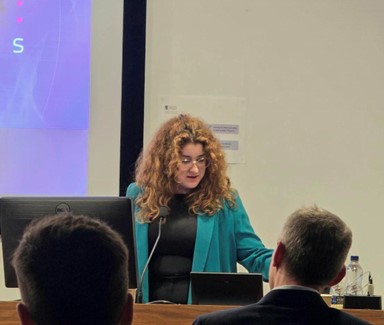Miss Kalliopi Mavromati
- Research Assistant (Cardiovascular & Metabolic Health)
Biography
I graduated from the University of Glasgow in 2022 (BSc Hons in Psychology with Neuroscience specialism). During my studies, I held various internships in research projects and as a data analyst, including in the College of Science and Engineering, Adam Smith Business School, and Planning, Insights, and Analytics. As an analyst working with large datasets from different sources, I focused on producing transparent and user-friendly code that could be reused in future. In autumn 2022, I started working as an assistant statistician in Scottish Government, where I led the development of reproducible analytical pipelines with advanced statistical techniques and design that is robust to human error during future re-use. In this role, I also liaised with end-users to create data collection materials and supported quality assurance of datasets and other code. I started my work as a research assistant at the University of Glasgow part time, before leaving my statistics post to be a full-time researcher in early 2024. Since then, I led the delivery of the Bio-Hermes-001 data challenge and I continue to lead the design and governance of a multi-site trial to validate a RESQ+ digital health tool. Passionate about sharing science, I am an accomplished communicator, experienced across platforms ranging from international scientific conferences to lay focus groups.
Research interests
Research Theme: Vascular Diseases and Comorbidities
I enjoy person-centred research that synthesises quantitative and qualitative evidence to improve outcomes for populations typically underrepresented in research. I enjoy collaborative research that crosses traditional boundaries between disciplines and sectors, where I am equally comfortable as a contributor and leader. With a background in psychology and data science, I am skilled and experienced in secondary analysis of big data.
I am passionate about research that can make a difference, and that requires that everything we use in our research represents and measures exactly what we think it does.
With an overarching epistemological perspective, my current work is in two themes:
- Working with the EU-funded RESQ+ consortium, I help develop valid and reliable tools and processes for the digital delivery of Patient Reported Outcome Measures (PROMs) as part of a digital tool to support stroke survivors post discharge.
- Working with the Brain Health ARC, I managed the delivery of the BioHermes Data Challenge, which opened up a large, multimodal, dataset of biomarkers in a demographically diverse cohort of older adults.
For this purpose, so far I have led qualitative research to understand the potential usefulness and barriers to a stroke-specific Virtual Assistant (VA), and mixed methods pilot testing of a VA prototype alongside quantitative psychometric assessments of the measures to be used. I also validated the short-form Nottingham Extended Activities of Daily Living (SFNEADL) scale and evaluated the additional psychometric utility of including modern activities, like mobile banking and social media.
I am collaborating with researchers from the challenge in order to explore various mechanisms underlying presentation of Alzheimer’s dementia, including frailty, risk, and resilience to developing Alzheimer’s dementia. The choice of biomarkers used for each operational definition in these analyses can drastically alter the mechanistic conclusions that can be drawn and I am currently exploring this in review of molecular psychiatry evidence.
Grants
Grants and Awards listed are those received whilst working with the University of Glasgow.
- Resistance and cognitive resilience to Alzheimer's dementia: creating a robust definition and phenotype
Scottish Funding Council
2024 - 2025



